IAP 607: Leadership, Communication, Hotel Centennial Analysis
VerifiedAdded on 2023/04/07
|32
|5889
|261
Report
AI Summary
This report examines the effectiveness of leadership and open communication on the productivity of Hotel Centennial, a popular Sydney hotel facing consumer dissatisfaction due to service and food quality issues. The report employs an explanatory research design and interpretivism philosophy, collecting both primary and secondary data, including an interview with the general manager analyzed using grounded theory. A literature review explores open communication, leadership styles in the Australian hospitality industry, and the relationship between consumer satisfaction and productivity. The research aims to identify strategies for enhancing employee and consumer satisfaction, ultimately increasing organizational productivity, and provides recommendations based on the current conditions of the hotel.
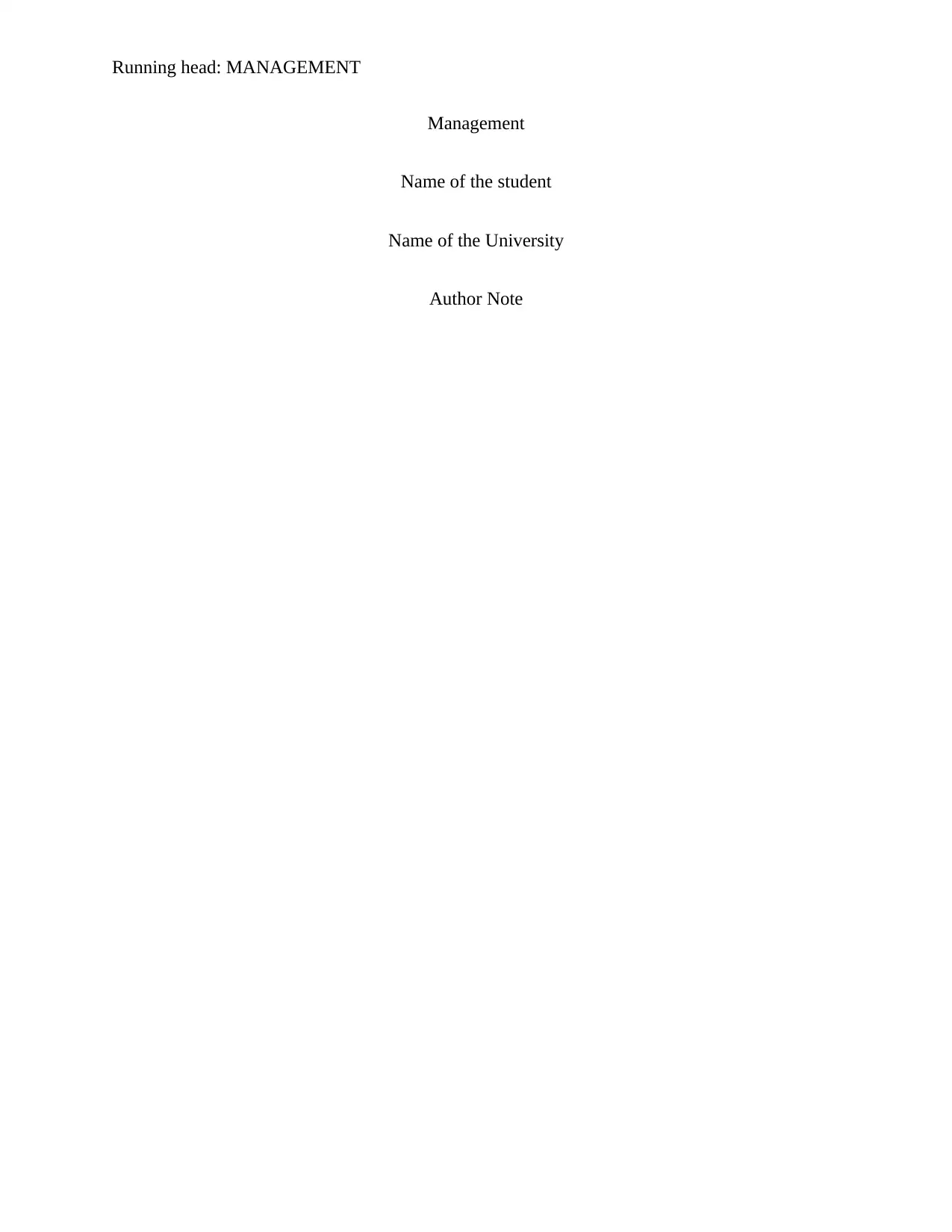
Running head: MANAGEMENT
Management
Name of the student
Name of the University
Author Note
Management
Name of the student
Name of the University
Author Note
Paraphrase This Document
Need a fresh take? Get an instant paraphrase of this document with our AI Paraphraser
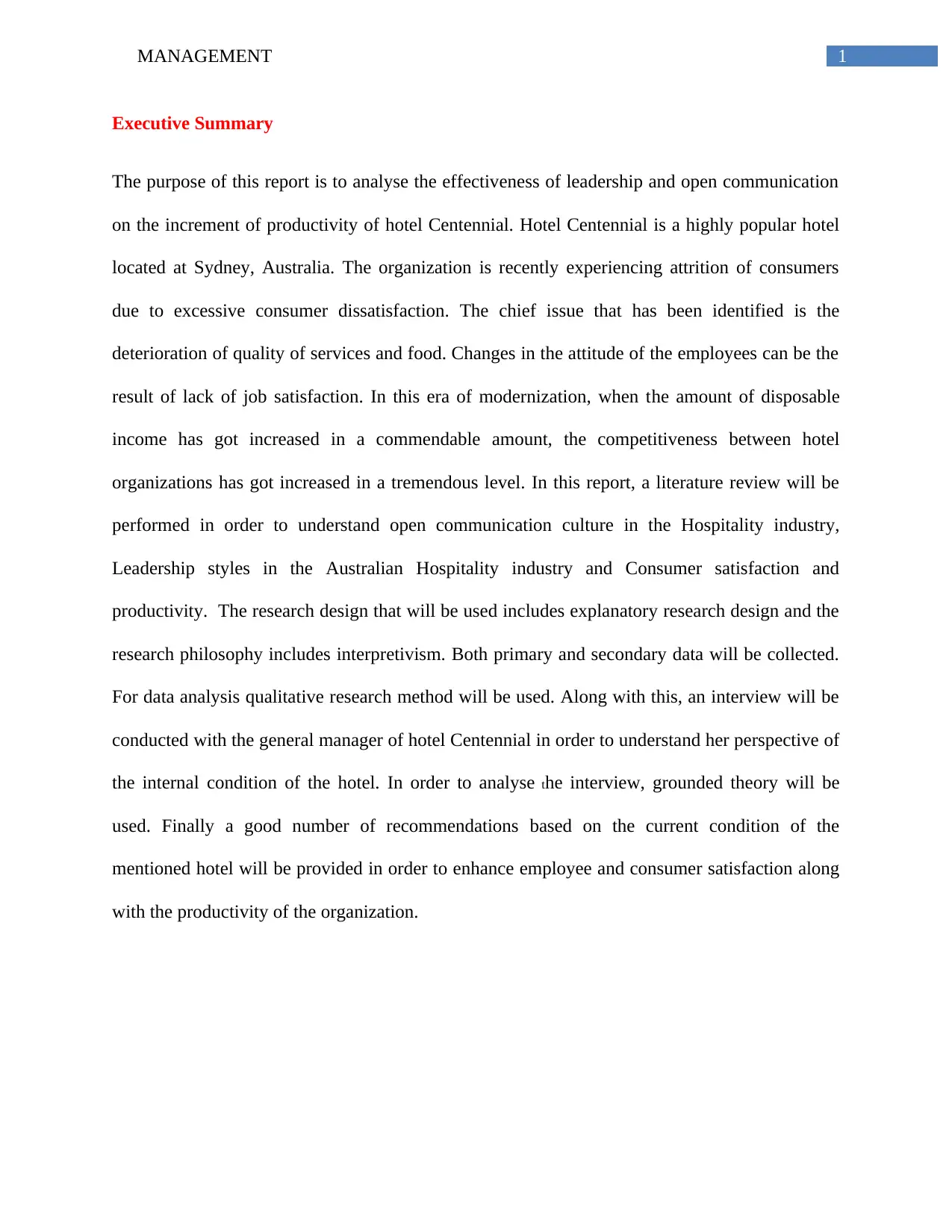
1MANAGEMENT
Executive Summary
The purpose of this report is to analyse the effectiveness of leadership and open communication
on the increment of productivity of hotel Centennial. Hotel Centennial is a highly popular hotel
located at Sydney, Australia. The organization is recently experiencing attrition of consumers
due to excessive consumer dissatisfaction. The chief issue that has been identified is the
deterioration of quality of services and food. Changes in the attitude of the employees can be the
result of lack of job satisfaction. In this era of modernization, when the amount of disposable
income has got increased in a commendable amount, the competitiveness between hotel
organizations has got increased in a tremendous level. In this report, a literature review will be
performed in order to understand open communication culture in the Hospitality industry,
Leadership styles in the Australian Hospitality industry and Consumer satisfaction and
productivity. The research design that will be used includes explanatory research design and the
research philosophy includes interpretivism. Both primary and secondary data will be collected.
For data analysis qualitative research method will be used. Along with this, an interview will be
conducted with the general manager of hotel Centennial in order to understand her perspective of
the internal condition of the hotel. In order to analyse the interview, grounded theory will be
used. Finally a good number of recommendations based on the current condition of the
mentioned hotel will be provided in order to enhance employee and consumer satisfaction along
with the productivity of the organization.
Executive Summary
The purpose of this report is to analyse the effectiveness of leadership and open communication
on the increment of productivity of hotel Centennial. Hotel Centennial is a highly popular hotel
located at Sydney, Australia. The organization is recently experiencing attrition of consumers
due to excessive consumer dissatisfaction. The chief issue that has been identified is the
deterioration of quality of services and food. Changes in the attitude of the employees can be the
result of lack of job satisfaction. In this era of modernization, when the amount of disposable
income has got increased in a commendable amount, the competitiveness between hotel
organizations has got increased in a tremendous level. In this report, a literature review will be
performed in order to understand open communication culture in the Hospitality industry,
Leadership styles in the Australian Hospitality industry and Consumer satisfaction and
productivity. The research design that will be used includes explanatory research design and the
research philosophy includes interpretivism. Both primary and secondary data will be collected.
For data analysis qualitative research method will be used. Along with this, an interview will be
conducted with the general manager of hotel Centennial in order to understand her perspective of
the internal condition of the hotel. In order to analyse the interview, grounded theory will be
used. Finally a good number of recommendations based on the current condition of the
mentioned hotel will be provided in order to enhance employee and consumer satisfaction along
with the productivity of the organization.
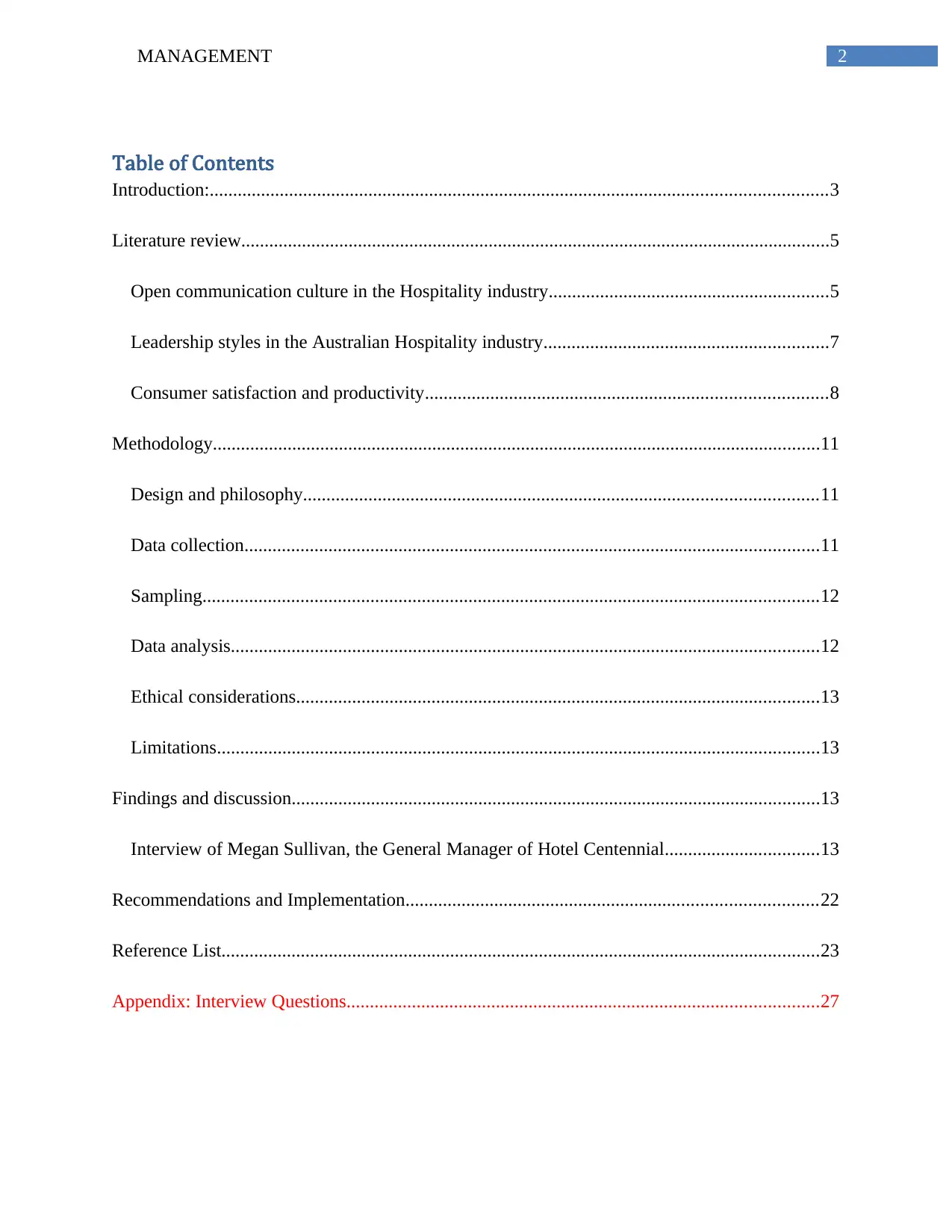
2MANAGEMENT
Table of Contents
Introduction:....................................................................................................................................3
Literature review..............................................................................................................................5
Open communication culture in the Hospitality industry............................................................5
Leadership styles in the Australian Hospitality industry.............................................................7
Consumer satisfaction and productivity......................................................................................8
Methodology..................................................................................................................................11
Design and philosophy..............................................................................................................11
Data collection...........................................................................................................................11
Sampling....................................................................................................................................12
Data analysis..............................................................................................................................12
Ethical considerations................................................................................................................13
Limitations.................................................................................................................................13
Findings and discussion.................................................................................................................13
Interview of Megan Sullivan, the General Manager of Hotel Centennial.................................13
Recommendations and Implementation........................................................................................22
Reference List................................................................................................................................23
Appendix: Interview Questions.....................................................................................................27
Table of Contents
Introduction:....................................................................................................................................3
Literature review..............................................................................................................................5
Open communication culture in the Hospitality industry............................................................5
Leadership styles in the Australian Hospitality industry.............................................................7
Consumer satisfaction and productivity......................................................................................8
Methodology..................................................................................................................................11
Design and philosophy..............................................................................................................11
Data collection...........................................................................................................................11
Sampling....................................................................................................................................12
Data analysis..............................................................................................................................12
Ethical considerations................................................................................................................13
Limitations.................................................................................................................................13
Findings and discussion.................................................................................................................13
Interview of Megan Sullivan, the General Manager of Hotel Centennial.................................13
Recommendations and Implementation........................................................................................22
Reference List................................................................................................................................23
Appendix: Interview Questions.....................................................................................................27
⊘ This is a preview!⊘
Do you want full access?
Subscribe today to unlock all pages.

Trusted by 1+ million students worldwide
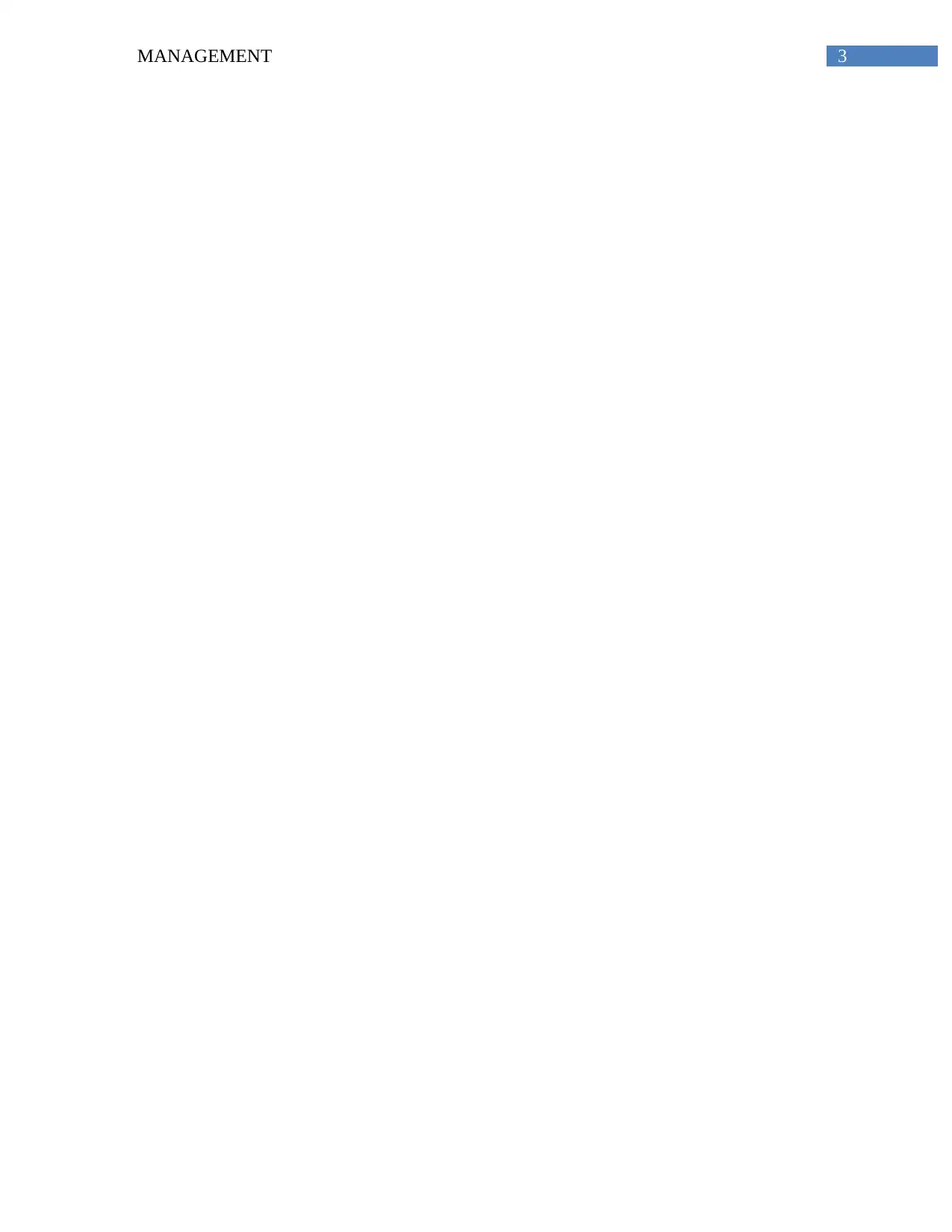
3MANAGEMENT
Paraphrase This Document
Need a fresh take? Get an instant paraphrase of this document with our AI Paraphraser
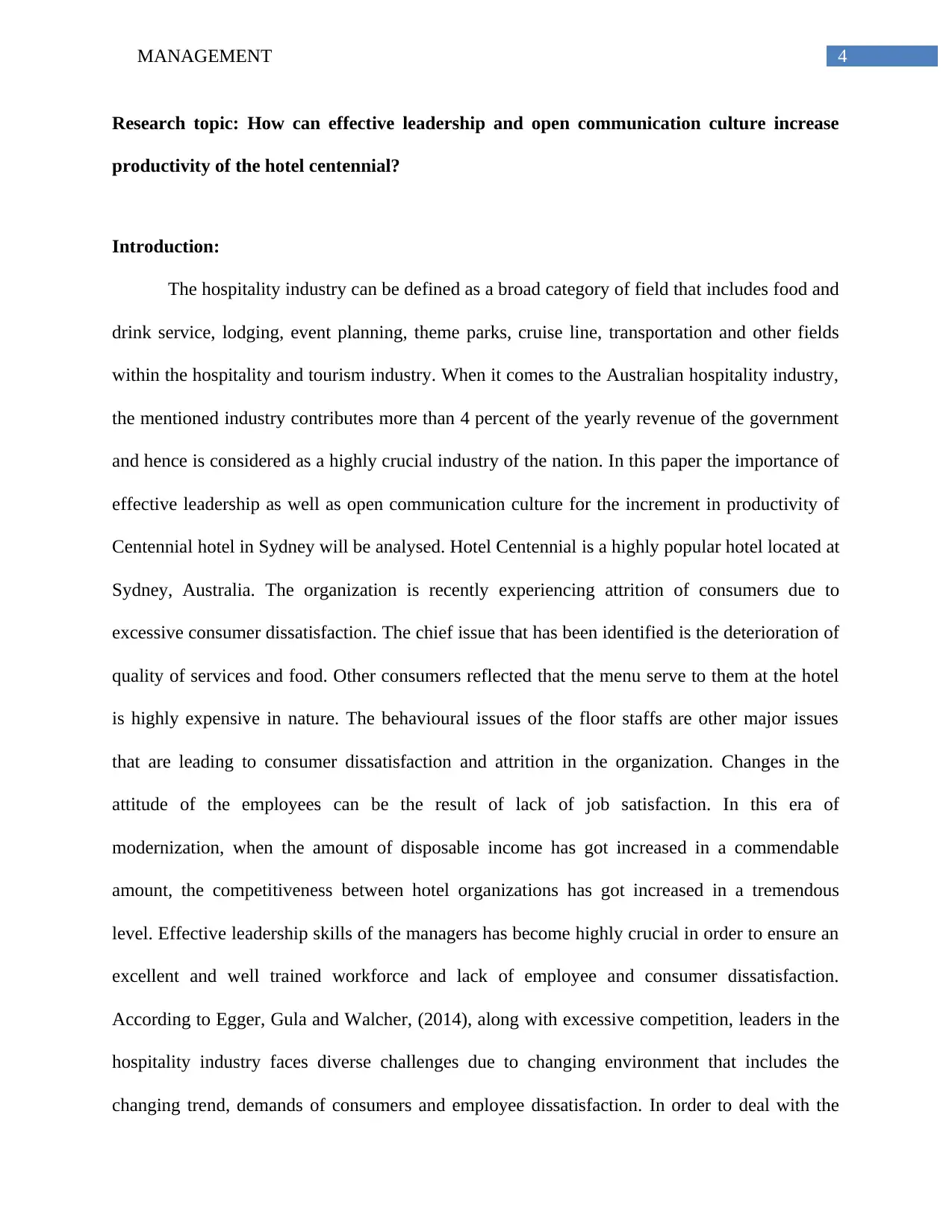
4MANAGEMENT
Research topic: How can effective leadership and open communication culture increase
productivity of the hotel centennial?
Introduction:
The hospitality industry can be defined as a broad category of field that includes food and
drink service, lodging, event planning, theme parks, cruise line, transportation and other fields
within the hospitality and tourism industry. When it comes to the Australian hospitality industry,
the mentioned industry contributes more than 4 percent of the yearly revenue of the government
and hence is considered as a highly crucial industry of the nation. In this paper the importance of
effective leadership as well as open communication culture for the increment in productivity of
Centennial hotel in Sydney will be analysed. Hotel Centennial is a highly popular hotel located at
Sydney, Australia. The organization is recently experiencing attrition of consumers due to
excessive consumer dissatisfaction. The chief issue that has been identified is the deterioration of
quality of services and food. Other consumers reflected that the menu serve to them at the hotel
is highly expensive in nature. The behavioural issues of the floor staffs are other major issues
that are leading to consumer dissatisfaction and attrition in the organization. Changes in the
attitude of the employees can be the result of lack of job satisfaction. In this era of
modernization, when the amount of disposable income has got increased in a commendable
amount, the competitiveness between hotel organizations has got increased in a tremendous
level. Effective leadership skills of the managers has become highly crucial in order to ensure an
excellent and well trained workforce and lack of employee and consumer dissatisfaction.
According to Egger, Gula and Walcher, (2014), along with excessive competition, leaders in the
hospitality industry faces diverse challenges due to changing environment that includes the
changing trend, demands of consumers and employee dissatisfaction. In order to deal with the
Research topic: How can effective leadership and open communication culture increase
productivity of the hotel centennial?
Introduction:
The hospitality industry can be defined as a broad category of field that includes food and
drink service, lodging, event planning, theme parks, cruise line, transportation and other fields
within the hospitality and tourism industry. When it comes to the Australian hospitality industry,
the mentioned industry contributes more than 4 percent of the yearly revenue of the government
and hence is considered as a highly crucial industry of the nation. In this paper the importance of
effective leadership as well as open communication culture for the increment in productivity of
Centennial hotel in Sydney will be analysed. Hotel Centennial is a highly popular hotel located at
Sydney, Australia. The organization is recently experiencing attrition of consumers due to
excessive consumer dissatisfaction. The chief issue that has been identified is the deterioration of
quality of services and food. Other consumers reflected that the menu serve to them at the hotel
is highly expensive in nature. The behavioural issues of the floor staffs are other major issues
that are leading to consumer dissatisfaction and attrition in the organization. Changes in the
attitude of the employees can be the result of lack of job satisfaction. In this era of
modernization, when the amount of disposable income has got increased in a commendable
amount, the competitiveness between hotel organizations has got increased in a tremendous
level. Effective leadership skills of the managers has become highly crucial in order to ensure an
excellent and well trained workforce and lack of employee and consumer dissatisfaction.
According to Egger, Gula and Walcher, (2014), along with excessive competition, leaders in the
hospitality industry faces diverse challenges due to changing environment that includes the
changing trend, demands of consumers and employee dissatisfaction. In order to deal with the
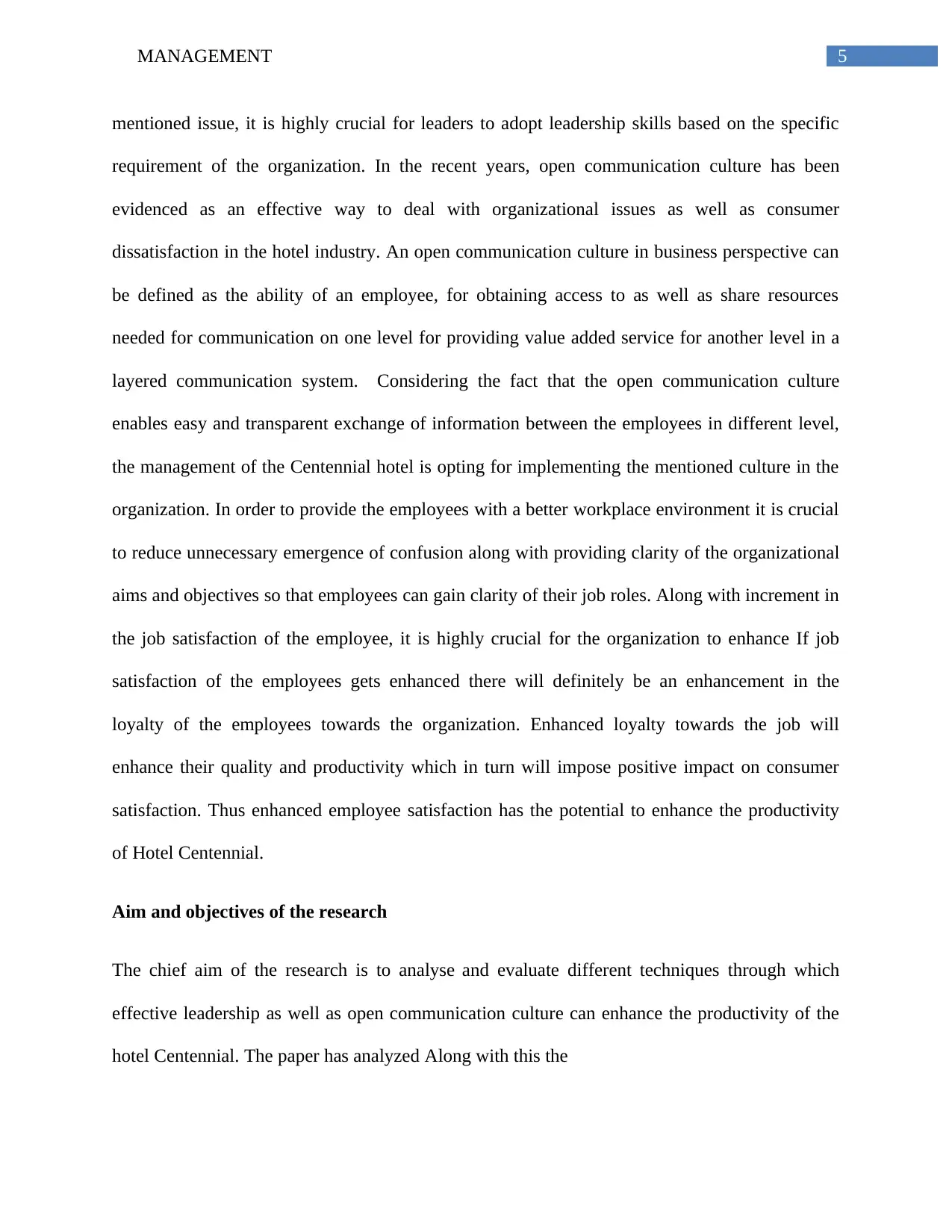
5MANAGEMENT
mentioned issue, it is highly crucial for leaders to adopt leadership skills based on the specific
requirement of the organization. In the recent years, open communication culture has been
evidenced as an effective way to deal with organizational issues as well as consumer
dissatisfaction in the hotel industry. An open communication culture in business perspective can
be defined as the ability of an employee, for obtaining access to as well as share resources
needed for communication on one level for providing value added service for another level in a
layered communication system. Considering the fact that the open communication culture
enables easy and transparent exchange of information between the employees in different level,
the management of the Centennial hotel is opting for implementing the mentioned culture in the
organization. In order to provide the employees with a better workplace environment it is crucial
to reduce unnecessary emergence of confusion along with providing clarity of the organizational
aims and objectives so that employees can gain clarity of their job roles. Along with increment in
the job satisfaction of the employee, it is highly crucial for the organization to enhance If job
satisfaction of the employees gets enhanced there will definitely be an enhancement in the
loyalty of the employees towards the organization. Enhanced loyalty towards the job will
enhance their quality and productivity which in turn will impose positive impact on consumer
satisfaction. Thus enhanced employee satisfaction has the potential to enhance the productivity
of Hotel Centennial.
Aim and objectives of the research
The chief aim of the research is to analyse and evaluate different techniques through which
effective leadership as well as open communication culture can enhance the productivity of the
hotel Centennial. The paper has analyzed Along with this the
mentioned issue, it is highly crucial for leaders to adopt leadership skills based on the specific
requirement of the organization. In the recent years, open communication culture has been
evidenced as an effective way to deal with organizational issues as well as consumer
dissatisfaction in the hotel industry. An open communication culture in business perspective can
be defined as the ability of an employee, for obtaining access to as well as share resources
needed for communication on one level for providing value added service for another level in a
layered communication system. Considering the fact that the open communication culture
enables easy and transparent exchange of information between the employees in different level,
the management of the Centennial hotel is opting for implementing the mentioned culture in the
organization. In order to provide the employees with a better workplace environment it is crucial
to reduce unnecessary emergence of confusion along with providing clarity of the organizational
aims and objectives so that employees can gain clarity of their job roles. Along with increment in
the job satisfaction of the employee, it is highly crucial for the organization to enhance If job
satisfaction of the employees gets enhanced there will definitely be an enhancement in the
loyalty of the employees towards the organization. Enhanced loyalty towards the job will
enhance their quality and productivity which in turn will impose positive impact on consumer
satisfaction. Thus enhanced employee satisfaction has the potential to enhance the productivity
of Hotel Centennial.
Aim and objectives of the research
The chief aim of the research is to analyse and evaluate different techniques through which
effective leadership as well as open communication culture can enhance the productivity of the
hotel Centennial. The paper has analyzed Along with this the
⊘ This is a preview!⊘
Do you want full access?
Subscribe today to unlock all pages.

Trusted by 1+ million students worldwide
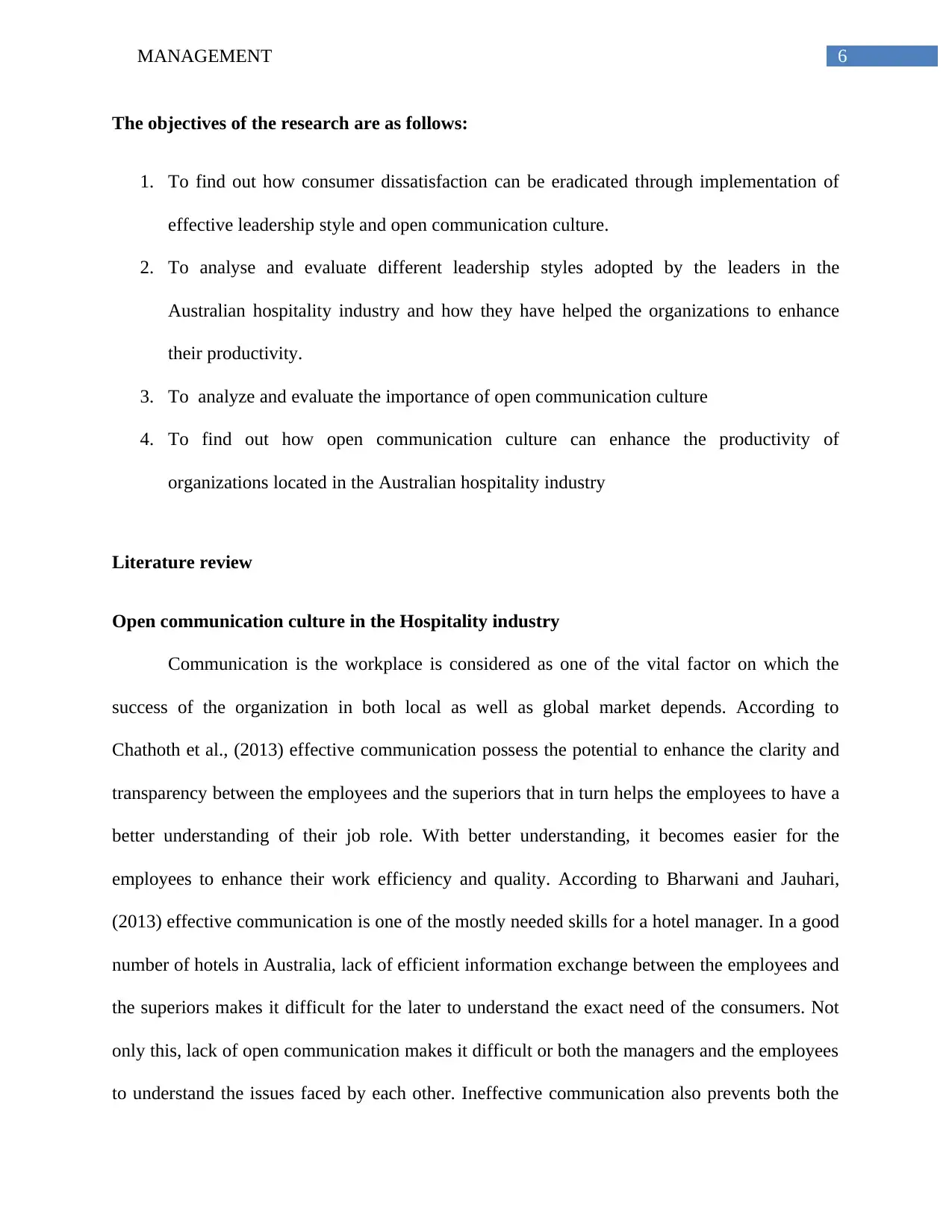
6MANAGEMENT
The objectives of the research are as follows:
1. To find out how consumer dissatisfaction can be eradicated through implementation of
effective leadership style and open communication culture.
2. To analyse and evaluate different leadership styles adopted by the leaders in the
Australian hospitality industry and how they have helped the organizations to enhance
their productivity.
3. To analyze and evaluate the importance of open communication culture
4. To find out how open communication culture can enhance the productivity of
organizations located in the Australian hospitality industry
Literature review
Open communication culture in the Hospitality industry
Communication is the workplace is considered as one of the vital factor on which the
success of the organization in both local as well as global market depends. According to
Chathoth et al., (2013) effective communication possess the potential to enhance the clarity and
transparency between the employees and the superiors that in turn helps the employees to have a
better understanding of their job role. With better understanding, it becomes easier for the
employees to enhance their work efficiency and quality. According to Bharwani and Jauhari,
(2013) effective communication is one of the mostly needed skills for a hotel manager. In a good
number of hotels in Australia, lack of efficient information exchange between the employees and
the superiors makes it difficult for the later to understand the exact need of the consumers. Not
only this, lack of open communication makes it difficult or both the managers and the employees
to understand the issues faced by each other. Ineffective communication also prevents both the
The objectives of the research are as follows:
1. To find out how consumer dissatisfaction can be eradicated through implementation of
effective leadership style and open communication culture.
2. To analyse and evaluate different leadership styles adopted by the leaders in the
Australian hospitality industry and how they have helped the organizations to enhance
their productivity.
3. To analyze and evaluate the importance of open communication culture
4. To find out how open communication culture can enhance the productivity of
organizations located in the Australian hospitality industry
Literature review
Open communication culture in the Hospitality industry
Communication is the workplace is considered as one of the vital factor on which the
success of the organization in both local as well as global market depends. According to
Chathoth et al., (2013) effective communication possess the potential to enhance the clarity and
transparency between the employees and the superiors that in turn helps the employees to have a
better understanding of their job role. With better understanding, it becomes easier for the
employees to enhance their work efficiency and quality. According to Bharwani and Jauhari,
(2013) effective communication is one of the mostly needed skills for a hotel manager. In a good
number of hotels in Australia, lack of efficient information exchange between the employees and
the superiors makes it difficult for the later to understand the exact need of the consumers. Not
only this, lack of open communication makes it difficult or both the managers and the employees
to understand the issues faced by each other. Ineffective communication also prevents both the
Paraphrase This Document
Need a fresh take? Get an instant paraphrase of this document with our AI Paraphraser
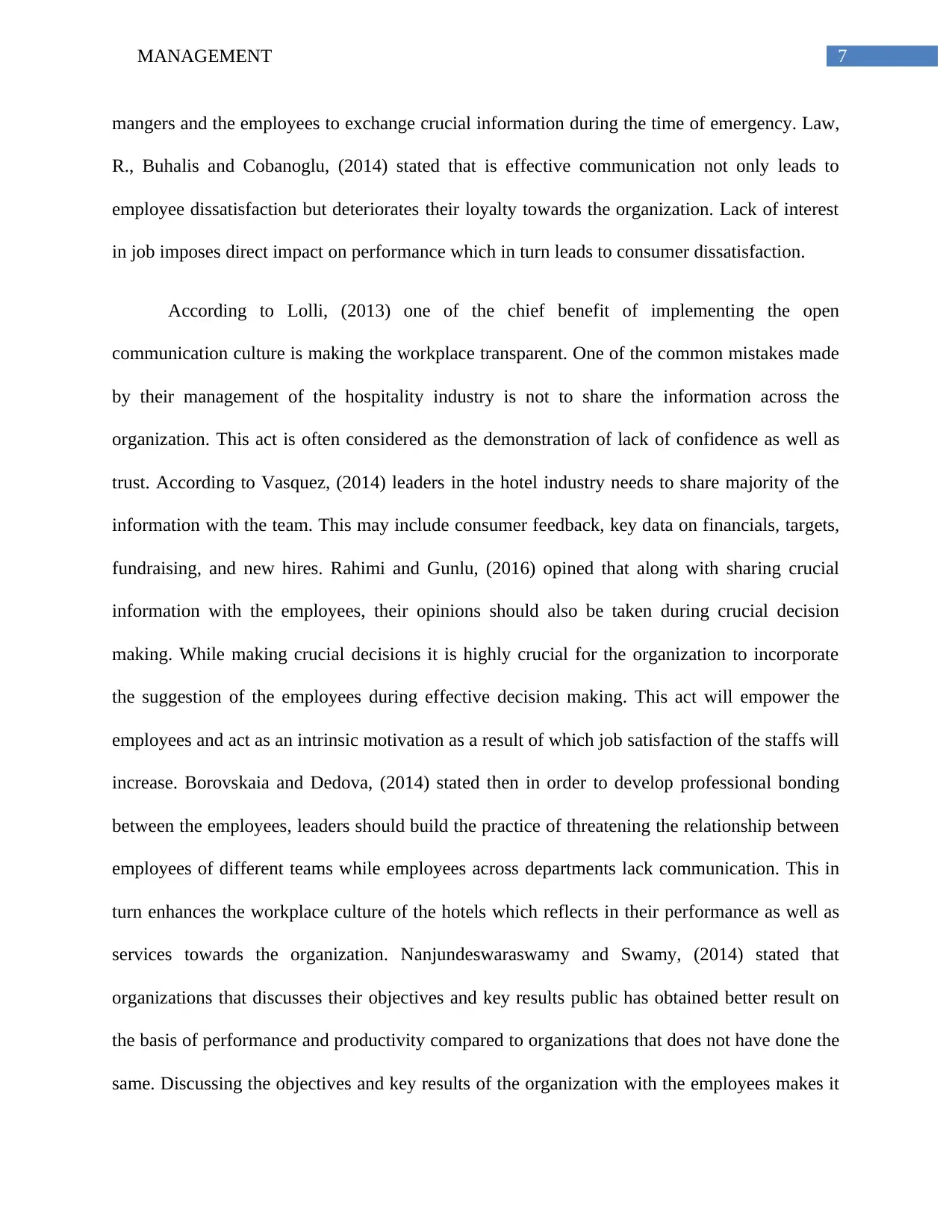
7MANAGEMENT
mangers and the employees to exchange crucial information during the time of emergency. Law,
R., Buhalis and Cobanoglu, (2014) stated that is effective communication not only leads to
employee dissatisfaction but deteriorates their loyalty towards the organization. Lack of interest
in job imposes direct impact on performance which in turn leads to consumer dissatisfaction.
According to Lolli, (2013) one of the chief benefit of implementing the open
communication culture is making the workplace transparent. One of the common mistakes made
by their management of the hospitality industry is not to share the information across the
organization. This act is often considered as the demonstration of lack of confidence as well as
trust. According to Vasquez, (2014) leaders in the hotel industry needs to share majority of the
information with the team. This may include consumer feedback, key data on financials, targets,
fundraising, and new hires. Rahimi and Gunlu, (2016) opined that along with sharing crucial
information with the employees, their opinions should also be taken during crucial decision
making. While making crucial decisions it is highly crucial for the organization to incorporate
the suggestion of the employees during effective decision making. This act will empower the
employees and act as an intrinsic motivation as a result of which job satisfaction of the staffs will
increase. Borovskaia and Dedova, (2014) stated then in order to develop professional bonding
between the employees, leaders should build the practice of threatening the relationship between
employees of different teams while employees across departments lack communication. This in
turn enhances the workplace culture of the hotels which reflects in their performance as well as
services towards the organization. Nanjundeswaraswamy and Swamy, (2014) stated that
organizations that discusses their objectives and key results public has obtained better result on
the basis of performance and productivity compared to organizations that does not have done the
same. Discussing the objectives and key results of the organization with the employees makes it
mangers and the employees to exchange crucial information during the time of emergency. Law,
R., Buhalis and Cobanoglu, (2014) stated that is effective communication not only leads to
employee dissatisfaction but deteriorates their loyalty towards the organization. Lack of interest
in job imposes direct impact on performance which in turn leads to consumer dissatisfaction.
According to Lolli, (2013) one of the chief benefit of implementing the open
communication culture is making the workplace transparent. One of the common mistakes made
by their management of the hospitality industry is not to share the information across the
organization. This act is often considered as the demonstration of lack of confidence as well as
trust. According to Vasquez, (2014) leaders in the hotel industry needs to share majority of the
information with the team. This may include consumer feedback, key data on financials, targets,
fundraising, and new hires. Rahimi and Gunlu, (2016) opined that along with sharing crucial
information with the employees, their opinions should also be taken during crucial decision
making. While making crucial decisions it is highly crucial for the organization to incorporate
the suggestion of the employees during effective decision making. This act will empower the
employees and act as an intrinsic motivation as a result of which job satisfaction of the staffs will
increase. Borovskaia and Dedova, (2014) stated then in order to develop professional bonding
between the employees, leaders should build the practice of threatening the relationship between
employees of different teams while employees across departments lack communication. This in
turn enhances the workplace culture of the hotels which reflects in their performance as well as
services towards the organization. Nanjundeswaraswamy and Swamy, (2014) stated that
organizations that discusses their objectives and key results public has obtained better result on
the basis of performance and productivity compared to organizations that does not have done the
same. Discussing the objectives and key results of the organization with the employees makes it
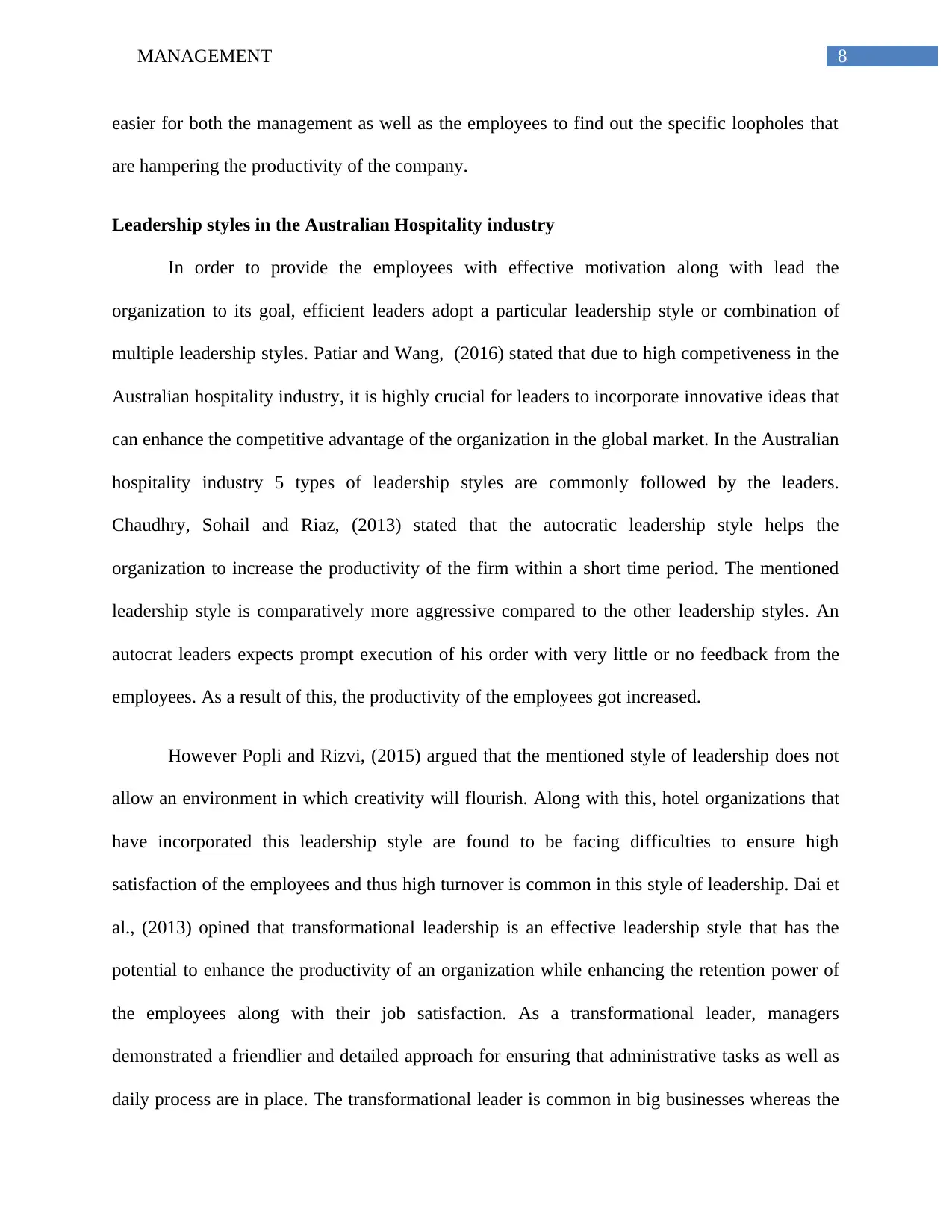
8MANAGEMENT
easier for both the management as well as the employees to find out the specific loopholes that
are hampering the productivity of the company.
Leadership styles in the Australian Hospitality industry
In order to provide the employees with effective motivation along with lead the
organization to its goal, efficient leaders adopt a particular leadership style or combination of
multiple leadership styles. Patiar and Wang, (2016) stated that due to high competiveness in the
Australian hospitality industry, it is highly crucial for leaders to incorporate innovative ideas that
can enhance the competitive advantage of the organization in the global market. In the Australian
hospitality industry 5 types of leadership styles are commonly followed by the leaders.
Chaudhry, Sohail and Riaz, (2013) stated that the autocratic leadership style helps the
organization to increase the productivity of the firm within a short time period. The mentioned
leadership style is comparatively more aggressive compared to the other leadership styles. An
autocrat leaders expects prompt execution of his order with very little or no feedback from the
employees. As a result of this, the productivity of the employees got increased.
However Popli and Rizvi, (2015) argued that the mentioned style of leadership does not
allow an environment in which creativity will flourish. Along with this, hotel organizations that
have incorporated this leadership style are found to be facing difficulties to ensure high
satisfaction of the employees and thus high turnover is common in this style of leadership. Dai et
al., (2013) opined that transformational leadership is an effective leadership style that has the
potential to enhance the productivity of an organization while enhancing the retention power of
the employees along with their job satisfaction. As a transformational leader, managers
demonstrated a friendlier and detailed approach for ensuring that administrative tasks as well as
daily process are in place. The transformational leader is common in big businesses whereas the
easier for both the management as well as the employees to find out the specific loopholes that
are hampering the productivity of the company.
Leadership styles in the Australian Hospitality industry
In order to provide the employees with effective motivation along with lead the
organization to its goal, efficient leaders adopt a particular leadership style or combination of
multiple leadership styles. Patiar and Wang, (2016) stated that due to high competiveness in the
Australian hospitality industry, it is highly crucial for leaders to incorporate innovative ideas that
can enhance the competitive advantage of the organization in the global market. In the Australian
hospitality industry 5 types of leadership styles are commonly followed by the leaders.
Chaudhry, Sohail and Riaz, (2013) stated that the autocratic leadership style helps the
organization to increase the productivity of the firm within a short time period. The mentioned
leadership style is comparatively more aggressive compared to the other leadership styles. An
autocrat leaders expects prompt execution of his order with very little or no feedback from the
employees. As a result of this, the productivity of the employees got increased.
However Popli and Rizvi, (2015) argued that the mentioned style of leadership does not
allow an environment in which creativity will flourish. Along with this, hotel organizations that
have incorporated this leadership style are found to be facing difficulties to ensure high
satisfaction of the employees and thus high turnover is common in this style of leadership. Dai et
al., (2013) opined that transformational leadership is an effective leadership style that has the
potential to enhance the productivity of an organization while enhancing the retention power of
the employees along with their job satisfaction. As a transformational leader, managers
demonstrated a friendlier and detailed approach for ensuring that administrative tasks as well as
daily process are in place. The transformational leader is common in big businesses whereas the
⊘ This is a preview!⊘
Do you want full access?
Subscribe today to unlock all pages.

Trusted by 1+ million students worldwide
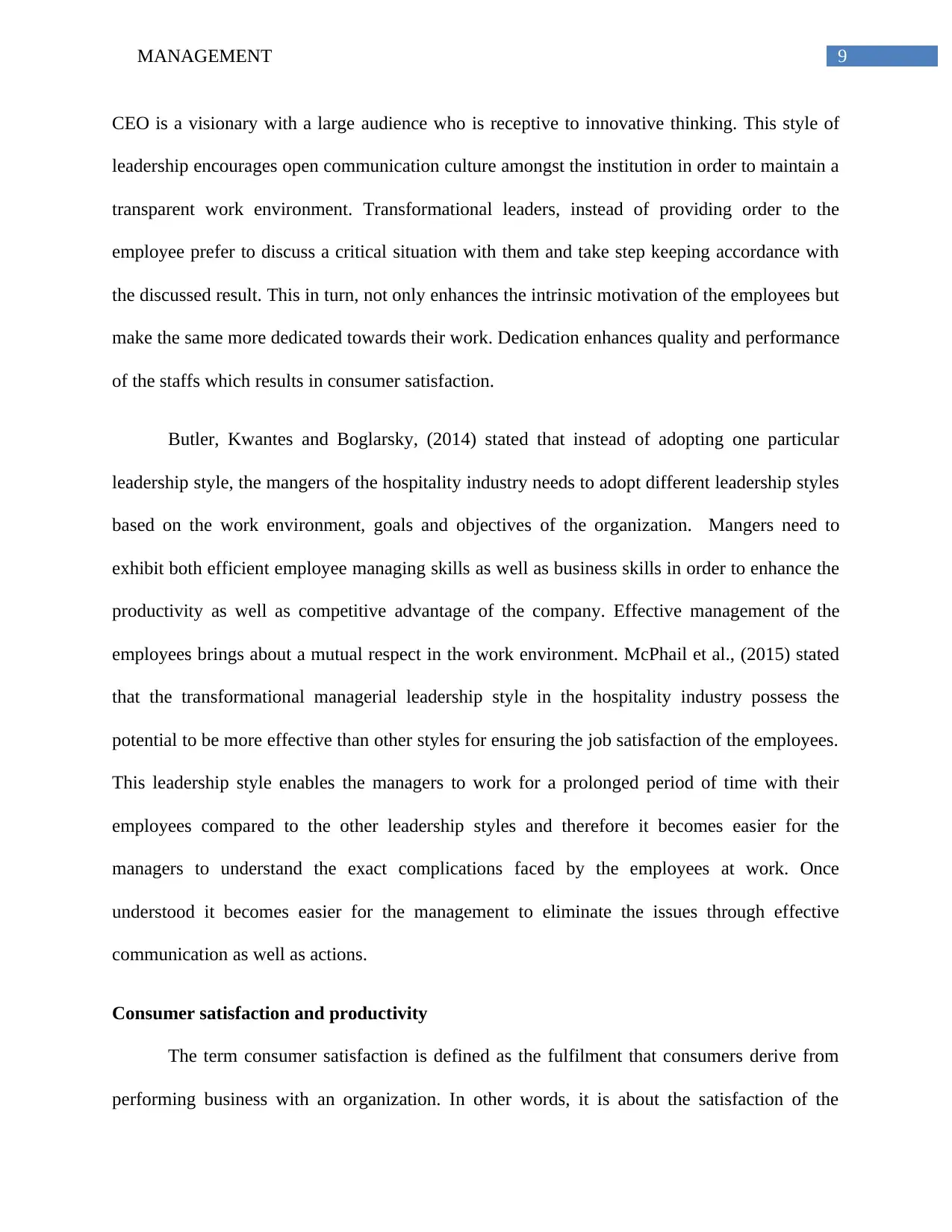
9MANAGEMENT
CEO is a visionary with a large audience who is receptive to innovative thinking. This style of
leadership encourages open communication culture amongst the institution in order to maintain a
transparent work environment. Transformational leaders, instead of providing order to the
employee prefer to discuss a critical situation with them and take step keeping accordance with
the discussed result. This in turn, not only enhances the intrinsic motivation of the employees but
make the same more dedicated towards their work. Dedication enhances quality and performance
of the staffs which results in consumer satisfaction.
Butler, Kwantes and Boglarsky, (2014) stated that instead of adopting one particular
leadership style, the mangers of the hospitality industry needs to adopt different leadership styles
based on the work environment, goals and objectives of the organization. Mangers need to
exhibit both efficient employee managing skills as well as business skills in order to enhance the
productivity as well as competitive advantage of the company. Effective management of the
employees brings about a mutual respect in the work environment. McPhail et al., (2015) stated
that the transformational managerial leadership style in the hospitality industry possess the
potential to be more effective than other styles for ensuring the job satisfaction of the employees.
This leadership style enables the managers to work for a prolonged period of time with their
employees compared to the other leadership styles and therefore it becomes easier for the
managers to understand the exact complications faced by the employees at work. Once
understood it becomes easier for the management to eliminate the issues through effective
communication as well as actions.
Consumer satisfaction and productivity
The term consumer satisfaction is defined as the fulfilment that consumers derive from
performing business with an organization. In other words, it is about the satisfaction of the
CEO is a visionary with a large audience who is receptive to innovative thinking. This style of
leadership encourages open communication culture amongst the institution in order to maintain a
transparent work environment. Transformational leaders, instead of providing order to the
employee prefer to discuss a critical situation with them and take step keeping accordance with
the discussed result. This in turn, not only enhances the intrinsic motivation of the employees but
make the same more dedicated towards their work. Dedication enhances quality and performance
of the staffs which results in consumer satisfaction.
Butler, Kwantes and Boglarsky, (2014) stated that instead of adopting one particular
leadership style, the mangers of the hospitality industry needs to adopt different leadership styles
based on the work environment, goals and objectives of the organization. Mangers need to
exhibit both efficient employee managing skills as well as business skills in order to enhance the
productivity as well as competitive advantage of the company. Effective management of the
employees brings about a mutual respect in the work environment. McPhail et al., (2015) stated
that the transformational managerial leadership style in the hospitality industry possess the
potential to be more effective than other styles for ensuring the job satisfaction of the employees.
This leadership style enables the managers to work for a prolonged period of time with their
employees compared to the other leadership styles and therefore it becomes easier for the
managers to understand the exact complications faced by the employees at work. Once
understood it becomes easier for the management to eliminate the issues through effective
communication as well as actions.
Consumer satisfaction and productivity
The term consumer satisfaction is defined as the fulfilment that consumers derive from
performing business with an organization. In other words, it is about the satisfaction of the
Paraphrase This Document
Need a fresh take? Get an instant paraphrase of this document with our AI Paraphraser
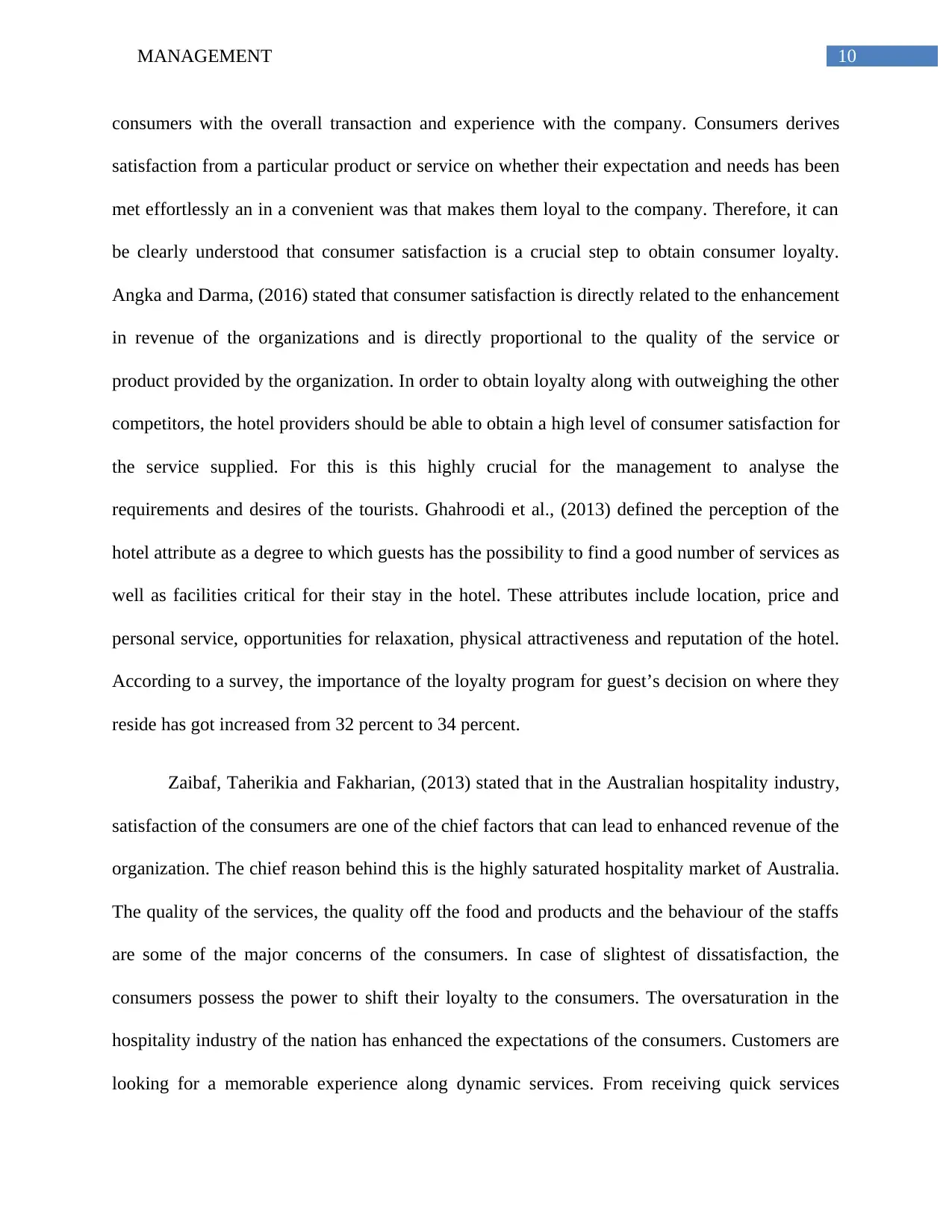
10MANAGEMENT
consumers with the overall transaction and experience with the company. Consumers derives
satisfaction from a particular product or service on whether their expectation and needs has been
met effortlessly an in a convenient was that makes them loyal to the company. Therefore, it can
be clearly understood that consumer satisfaction is a crucial step to obtain consumer loyalty.
Angka and Darma, (2016) stated that consumer satisfaction is directly related to the enhancement
in revenue of the organizations and is directly proportional to the quality of the service or
product provided by the organization. In order to obtain loyalty along with outweighing the other
competitors, the hotel providers should be able to obtain a high level of consumer satisfaction for
the service supplied. For this is this highly crucial for the management to analyse the
requirements and desires of the tourists. Ghahroodi et al., (2013) defined the perception of the
hotel attribute as a degree to which guests has the possibility to find a good number of services as
well as facilities critical for their stay in the hotel. These attributes include location, price and
personal service, opportunities for relaxation, physical attractiveness and reputation of the hotel.
According to a survey, the importance of the loyalty program for guest’s decision on where they
reside has got increased from 32 percent to 34 percent.
Zaibaf, Taherikia and Fakharian, (2013) stated that in the Australian hospitality industry,
satisfaction of the consumers are one of the chief factors that can lead to enhanced revenue of the
organization. The chief reason behind this is the highly saturated hospitality market of Australia.
The quality of the services, the quality off the food and products and the behaviour of the staffs
are some of the major concerns of the consumers. In case of slightest of dissatisfaction, the
consumers possess the power to shift their loyalty to the consumers. The oversaturation in the
hospitality industry of the nation has enhanced the expectations of the consumers. Customers are
looking for a memorable experience along dynamic services. From receiving quick services
consumers with the overall transaction and experience with the company. Consumers derives
satisfaction from a particular product or service on whether their expectation and needs has been
met effortlessly an in a convenient was that makes them loyal to the company. Therefore, it can
be clearly understood that consumer satisfaction is a crucial step to obtain consumer loyalty.
Angka and Darma, (2016) stated that consumer satisfaction is directly related to the enhancement
in revenue of the organizations and is directly proportional to the quality of the service or
product provided by the organization. In order to obtain loyalty along with outweighing the other
competitors, the hotel providers should be able to obtain a high level of consumer satisfaction for
the service supplied. For this is this highly crucial for the management to analyse the
requirements and desires of the tourists. Ghahroodi et al., (2013) defined the perception of the
hotel attribute as a degree to which guests has the possibility to find a good number of services as
well as facilities critical for their stay in the hotel. These attributes include location, price and
personal service, opportunities for relaxation, physical attractiveness and reputation of the hotel.
According to a survey, the importance of the loyalty program for guest’s decision on where they
reside has got increased from 32 percent to 34 percent.
Zaibaf, Taherikia and Fakharian, (2013) stated that in the Australian hospitality industry,
satisfaction of the consumers are one of the chief factors that can lead to enhanced revenue of the
organization. The chief reason behind this is the highly saturated hospitality market of Australia.
The quality of the services, the quality off the food and products and the behaviour of the staffs
are some of the major concerns of the consumers. In case of slightest of dissatisfaction, the
consumers possess the power to shift their loyalty to the consumers. The oversaturation in the
hospitality industry of the nation has enhanced the expectations of the consumers. Customers are
looking for a memorable experience along dynamic services. From receiving quick services
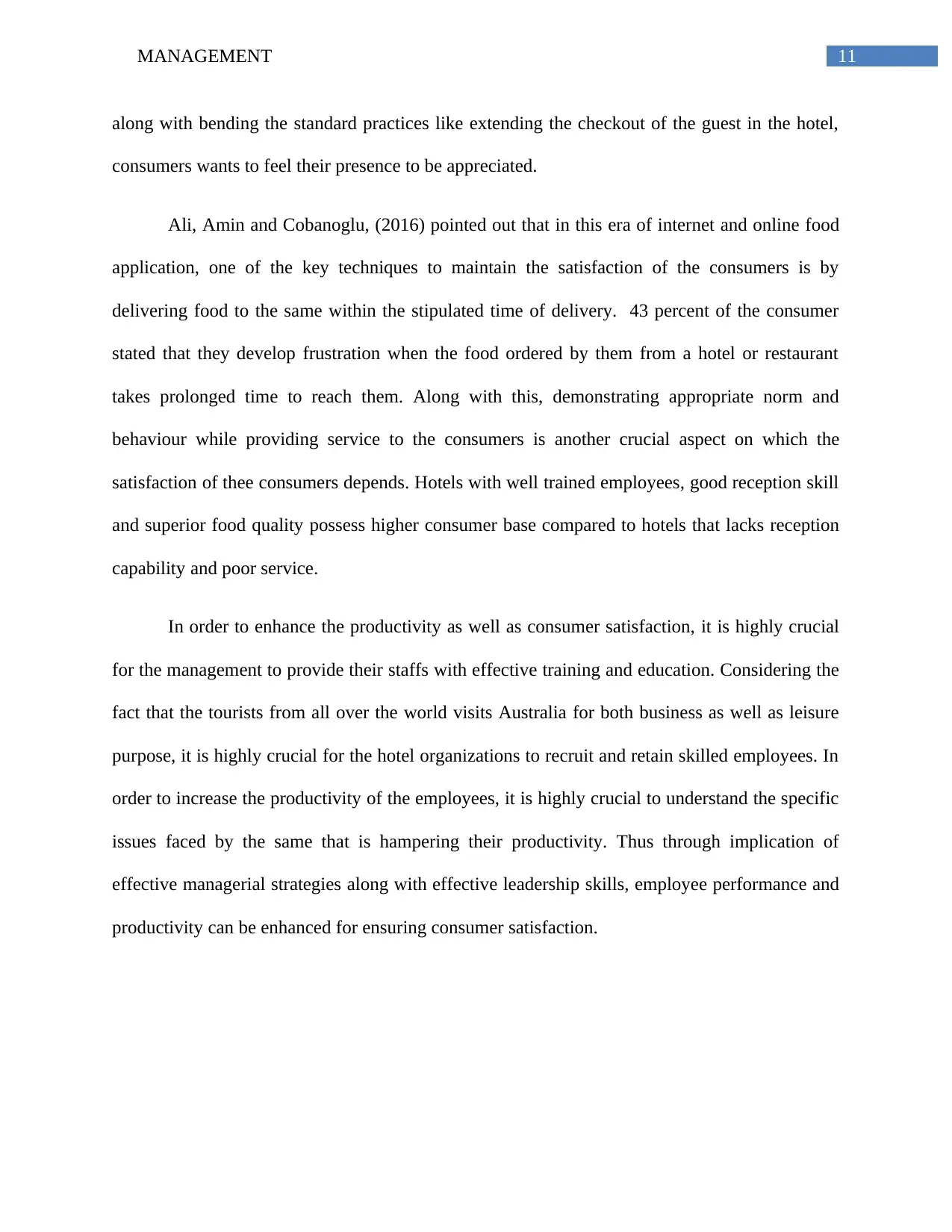
11MANAGEMENT
along with bending the standard practices like extending the checkout of the guest in the hotel,
consumers wants to feel their presence to be appreciated.
Ali, Amin and Cobanoglu, (2016) pointed out that in this era of internet and online food
application, one of the key techniques to maintain the satisfaction of the consumers is by
delivering food to the same within the stipulated time of delivery. 43 percent of the consumer
stated that they develop frustration when the food ordered by them from a hotel or restaurant
takes prolonged time to reach them. Along with this, demonstrating appropriate norm and
behaviour while providing service to the consumers is another crucial aspect on which the
satisfaction of thee consumers depends. Hotels with well trained employees, good reception skill
and superior food quality possess higher consumer base compared to hotels that lacks reception
capability and poor service.
In order to enhance the productivity as well as consumer satisfaction, it is highly crucial
for the management to provide their staffs with effective training and education. Considering the
fact that the tourists from all over the world visits Australia for both business as well as leisure
purpose, it is highly crucial for the hotel organizations to recruit and retain skilled employees. In
order to increase the productivity of the employees, it is highly crucial to understand the specific
issues faced by the same that is hampering their productivity. Thus through implication of
effective managerial strategies along with effective leadership skills, employee performance and
productivity can be enhanced for ensuring consumer satisfaction.
along with bending the standard practices like extending the checkout of the guest in the hotel,
consumers wants to feel their presence to be appreciated.
Ali, Amin and Cobanoglu, (2016) pointed out that in this era of internet and online food
application, one of the key techniques to maintain the satisfaction of the consumers is by
delivering food to the same within the stipulated time of delivery. 43 percent of the consumer
stated that they develop frustration when the food ordered by them from a hotel or restaurant
takes prolonged time to reach them. Along with this, demonstrating appropriate norm and
behaviour while providing service to the consumers is another crucial aspect on which the
satisfaction of thee consumers depends. Hotels with well trained employees, good reception skill
and superior food quality possess higher consumer base compared to hotels that lacks reception
capability and poor service.
In order to enhance the productivity as well as consumer satisfaction, it is highly crucial
for the management to provide their staffs with effective training and education. Considering the
fact that the tourists from all over the world visits Australia for both business as well as leisure
purpose, it is highly crucial for the hotel organizations to recruit and retain skilled employees. In
order to increase the productivity of the employees, it is highly crucial to understand the specific
issues faced by the same that is hampering their productivity. Thus through implication of
effective managerial strategies along with effective leadership skills, employee performance and
productivity can be enhanced for ensuring consumer satisfaction.
⊘ This is a preview!⊘
Do you want full access?
Subscribe today to unlock all pages.

Trusted by 1+ million students worldwide
1 out of 32
Related Documents
Your All-in-One AI-Powered Toolkit for Academic Success.
+13062052269
info@desklib.com
Available 24*7 on WhatsApp / Email
![[object Object]](/_next/static/media/star-bottom.7253800d.svg)
Unlock your academic potential
Copyright © 2020–2025 A2Z Services. All Rights Reserved. Developed and managed by ZUCOL.





